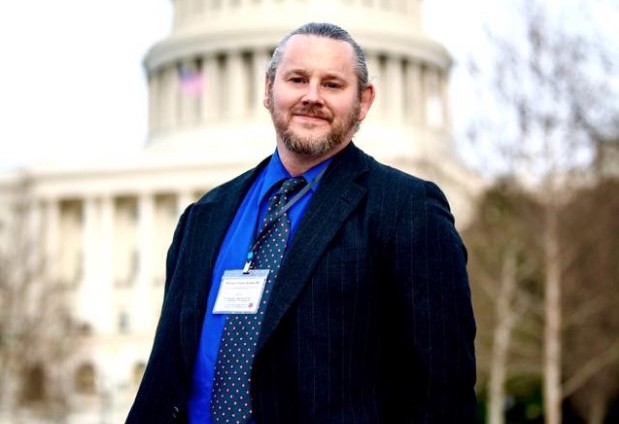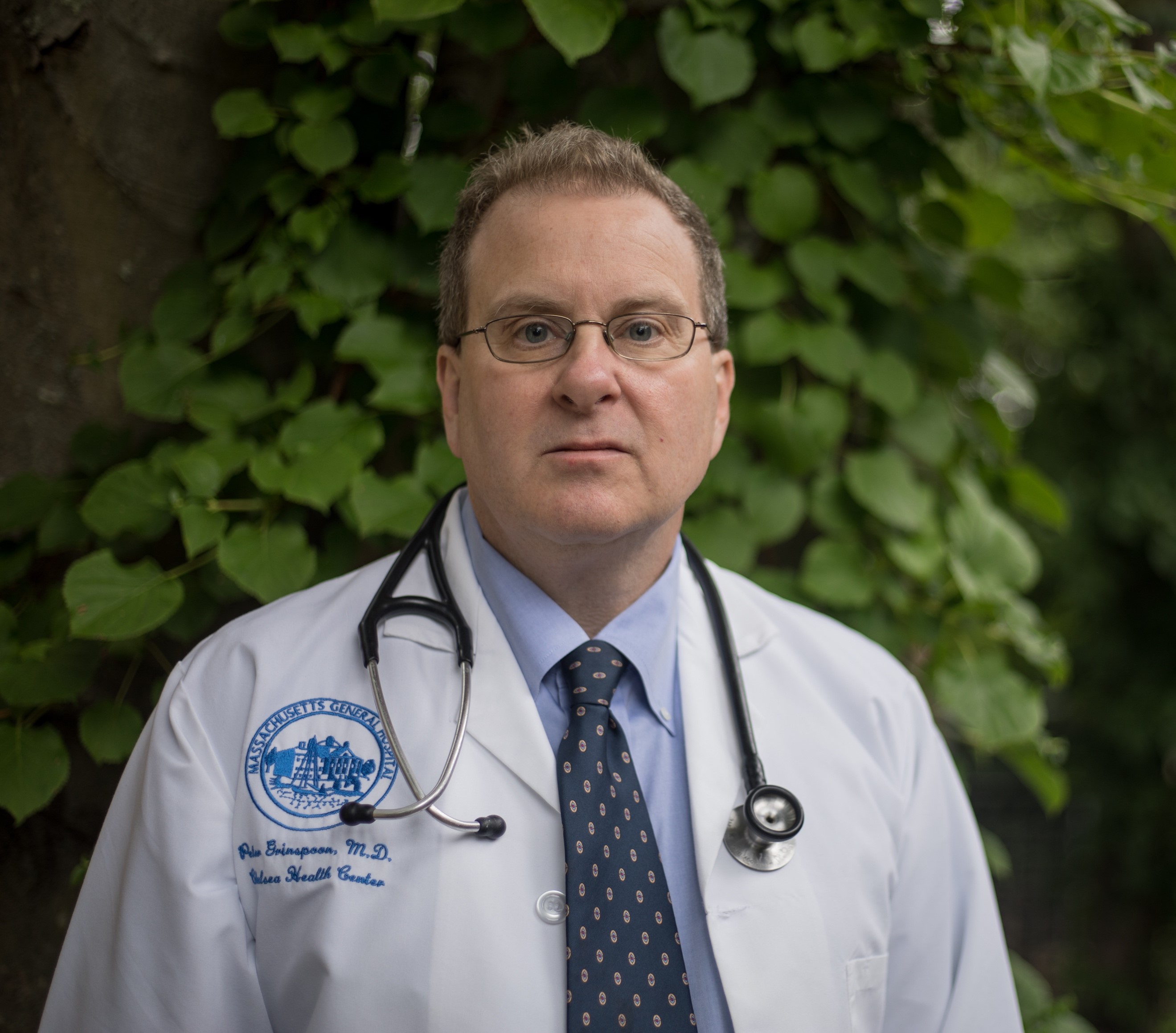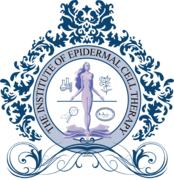Forum
Doctors and Nurses Addicted to Opioids Are Often Barred from the Most Effective Treatment
Taking proven medications like buprenorphine and methadone could mean losing their medical licenses.
BILL KINKLE, A REGISTERED NURSE IN PENNSYLVANIA/COURTESY OF BILL KINKLE; SUBOXONE MEDICATION/BLOOMBERG VIA GETTY IMAGES
Wesley Boyd, an associate professor of psychiatry at Harvard, has spent years working with state programs that help doctors, nurses, and other healthcare workers who have become addicted to opioids get back on their feet professionally.
He supports these non-disciplinary programs, in which doctors and nurses enroll for a number of years and are closely monitored by addiction specialists and state authorities as they seek to maintain or restore their medical licenses.
But, he said, he is perplexed as to why these programs and other efforts to help healthcare providers generally do not stress a recovery method that has long been shown to be effective: the use of drugs like buprenorphine and methadone, known as opioid agonists, to relieve cravings.
“Obviously the data are clear that medication-assisted treatment is the best course of action,” said Boyd, who worked for Massachusetts’ Physician Health Services (previously known as the Society to Help Physicians) from 2004 to 2010. “Whether they're doctors, nurses, or anybody else, [they] can function perfectly well at work and in their lives generally while they're using medication-assisted treatment.”
Furthermore, he said, “the odds that they're going to stay sober while using medications for treatment are better.”
Clinical studies show medication treatment significantly decreases the rate of relapse and overdose more than other interventions alone, including abstinence models. Most advocates advise using medication in conjunction with regular therapy or counseling.
Legal and medical researchers also made this point in the New England Journal of Medicine last month, calling it "ironic that clinicians, who are better positioned than most people to acquire and afford opioid-agonist therapy, are often denied it."
But some healthcare professionals believe opioid agonists are just a substitute for the drugs a doctor is addicted to, and, since they bind to the same brain receptors as opioids, may affect providers’ ability to do their jobs. The opioid agonists help reduce relapses and cravings by stimulating the same pathways opioids do, but in a controlled manner that prevents a person from feeling high.
Treating healthcare workers for addiction without disciplining them
Non-disciplinary treatment programs have been operating in most states since the 1970s to help health professionals overcome their addiction. Instead of revoking the license of an individual who is found to be impaired on the job—a disciplinary proceeding—these peer-run programs try to get participants back to work with mandated treatment plans that include intensive therapy, monitoring their behavior in and out of the workplace, and, of course, drug testing.
Throughout treatment, participants are actively discouraged, if not outright banned, from using opioid agonists that could aid their recovery.
Members of the non-disciplinary program may advocate for a participant’s return to work when they believe the individual is ready, but, ultimately, it is the state board that determines when an individual is fit to care for patients.
Bill Kinkle, a registered nurse in Pennsylvania, developed an addiction to opioids more than a decade ago and lost his license. He tried several recovery programs but relapsed and overdosed several times.

He has been working with the state’s Peer Nurse Assistance Program to get his license back. When Kinkle asked if he could use Suboxone, a brand name for a combination of buprenorphine and naloxone, he was told that unless he had a detailed plan for tapering off the drug, the nurse assistance program would not allow it.
So he's treating his addiction through the state program without the medication. He was required to participate in a 30-day inpatient program, undergo partial hospitalization (in which a participant is treated for several hours a day but can go home in the evenings) for an additional three weeks, receive three months of intensive outpatient therapy, attend Alcoholics Anonymous meetings three to five times a week, and pay for expensive random urine screenings.
The Pennsylvania Peer Nurse Assistance Program did not respond to requests for comment.
Critics argue that the non-disciplinary programs can, in fact, feel more disciplinary than supportive and don’t help as many people as they could if opioid agonists were made available.
The programs “have no independent oversight and patients don’t have a recourse,” said Peter Grinspoon, an internist in Boston who had an opioid addiction and was both a participant in, and eventually a board member of, Massachusetts’ Physician Health Services program for addicted doctors.

Grinspoon, who also teaches at Harvard, said that although he was unaware of any formal state policy against addiction treatment with medication, none of the Massachusetts program’s participants with opioid addictions used opioid agonists while he served.
Some state officials are beginning to consider the use of drugs like buprenorphine and methadone. The North Carolina Medical Board, which handles physician licensing and discipline, is encouraging the state program for doctors with opioid addictions to introduce these medications.
Impairment in safety-sensitive positions
Scott Teitelbaum, medical director at the University of Florida Recovery Center, which treats healthcare professionals from all over the country, said he sometimes prescribes the medicines to the half of his patients who don’t work in “safety-sensitive positions.”
But, he said, it makes sense to have a different strategy for patients in those positions. When the programs ask him if a person should return to practice, they’re not asking what’s best for the individual; they’re asking whether it’s safe for the public. And when patients are using agonist therapies, Teitelbaum—who also was treated for cocaine and marijuana use—said he isn’t sure it is.
A review in Mayo Clinic Proceedings of several studies in 2012 showed small effects of both methadone and suboxone on people's performance in measures such as reaction time and memory. The review was criticized for weak evidence and a lack of appropriate control groups.
Grinspoon noted that doctors could be taking other medications that affect their performance but face no repercussions. For example, he said, they may take benzodiazepines for anxiety or Ambien to help them sleep.
“There are tons of pharmaceuticals that could affect our performance—all of which doctors are allowed to take,” he said. “It’s just because of the stigma that they're singling out addiction.”
What's the most effective treatment?
Critics of medication treatment often point to the overwhelming five-year success rates reported by the non-disciplinary programs—generally between 70 percent and 90 percent.
But Boyd is wary of those rosy statistics. First, he noted, they rarely count people who dropped out of the program or died by suicide. He said some professionals who never suffered from substance use disorder are forced into the program by bad evaluations.
So far, Kinkle, the nurse in Pennsylvania, has stayed on track, “white-knuckling it” without Suboxone. If all goes according to plan, his license will be reinstated in another 13 months.
“My wife found me multiple times after an overdose lying on the floor unconscious,” Kinkle said. “All that could have been prevented had I been offered” Suboxone.
Kaiser Health News (KHN) is a nonprofit news service covering health issues. It is an editorially independent program of the Kaiser Family Foundation that is not affiliated with Kaiser Permanente.
This is probably a big contribution to why there are so many prescriptive drugs in the streets because they are being given out to be sold. I've heard of people going to the hospital and literally buying pills from the pharmasist and of doctors just giving out prescriptions just being their asking for them and then them selling it.
I think the non disciplinary programs sound better than the disciplinary ones because it looks like their helping to integrate them back into work and working with them rather than punishing or leaving them without work which would probably make them want to use again. Opioids are incredibly strong and the withdrawal from them is incredibly harsh it can be so easy to be addicted to them if you are prone to it and have had a surgery where it was necessary to use them and I can't imagine if you are a nurse or doctor and you are surrounded by pain medications all day when you are addicted to them yourself and prescribing them to people and having to measure doses for treatments and surgeries which would probably make it very difficult if your body is already craving it. I think people react typically how they react to addicts like how can they do this to themselves, why on earth would they let themselves get addicted to that when they are health providers, how irresponsible it is and the lack of will power. I think a lot of people misunderstand addiction and think that it is a moral issue where the addict just needs to have more self control and that there is just something wrong with them to why they would be in this position in the first place but for an addict to be in an environment where everyone is looking at them like that would trigger them even more into using in the first place because there is a lack of understanding. But I think the questions to ask is what made the person susceptible to the addiction in the first place and what changes do they need to make in their life to where they can be in a position where they don't need to use the opioids again. And sometimes will power has nothing to to with it if you are that chemically dependent on a substance that going without it is worse than taking it, you can't just stop taking it and the addiction is usually calling for some lifestyle changes to replace it which is just my opinion.
My personal thoughts on this matter is that if a Dr. is seeking help for substance abuse, and is willing to go through the necessary treatment to get the help he/she needs then I believe if the treatment is recommended to include these anti-antagonist drugs to counter the physical/Emotional addiction they should be allowed. The reason I feel that way, is there are way to many drugs available that a doctor can take without any discipline actions, that are far worse than the risks from these counter drugs. Also, if a doctor is wanting to use these as part of their treatment, they already know that using opoiods while on these anti-antagonist drugs would be more harmful with serious side effects. If a doctor can use drugs like Ambian, or Xanax, and have no discipline, then I disagree with the current discipline action.
I have a few thoughts on this subject. If a person is addicted to pills and this surfaces the chance of getting into certain fields of medicine are out.
People should be monitered on a regular schedule to prevent relapse which is so easy to do when the substance is around them at work or home.
The Dr can seek help but must be screened at times to be sure they are not using again.
I agree with Debbie, even though doctors are human beings just like the rest of us what they do is extraordinary. They make life or death decisions for all of us and there can't be any excuse for being under the influence of any substance while on duty. If they comply with a treatment program and agree to regular drug screenings I do believe they should be given a second chance to return to work. I think the pressure they experience, the unconventional hours and the access they have to all medications will be a challenge. Its ashame to throw away a career that requires so much study and education
health care professionals need to be monitored at all times when it comes to medications, they have an advantage over most people and are the least expected to do something like this, but they in fact need to be monitored the most.
@deborah I agree, doctors need to be screened constantly for relapse purposes. The non-disciplinary program I think is a good idea, doctors need to be fully recovered and monitored at all times.
The opioid epidemic is a very dangerous one. For many years people have become addicted to them after medical treatments and it's an addiction that is hard to kick for many. I've always been afraid of taking medication because I had friends who became addicted to medications after surgical procedures and even overdosed after not getting the results they wanted from just one pill.
@sydneyhurdleiectskin-com This article reminds me of a series I used to watch years ago. Nurse Betty. She was a nurse who was addicted to opioids. She was a high functioning addict and a great nurse. She performed her duties exceptionally and always got lauded for her great work but she would steal medications from patients and the pharmacy at the hospital. She wanted to kick her addiction but was afraid she would lose her job if she came forward and revealed she was an addict.
@sydneyhurdleiectskin-com I agree. Fortunately, hospitals have implemented new policies through the years to track medications within the hospital, where doctors and nurses have to put in their identification numbers and sometimes patient information. They need to figure out a way to track if the amount that was taken out, was actually given to the patient.


